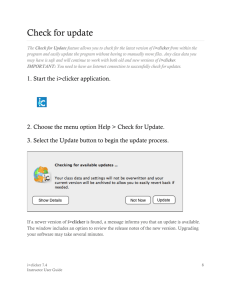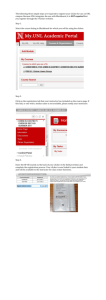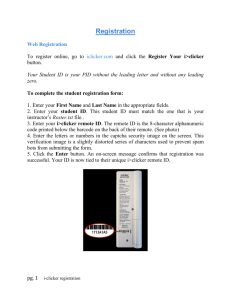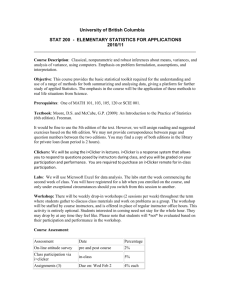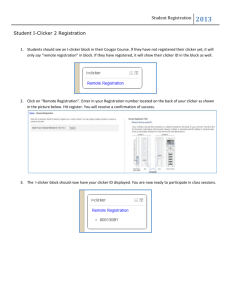Syllabus for PHY 1033 Discovering Physics
advertisement
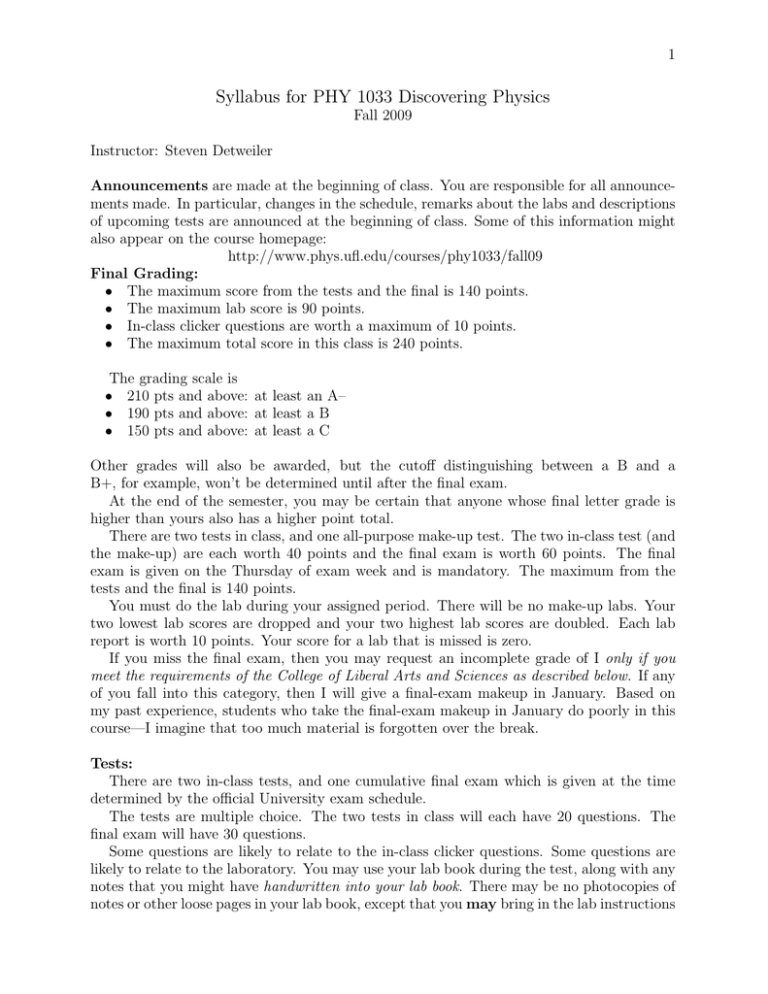
1 Syllabus for PHY 1033 Discovering Physics Fall 2009 Instructor: Steven Detweiler Announcements are made at the beginning of class. You are responsible for all announcements made. In particular, changes in the schedule, remarks about the labs and descriptions of upcoming tests are announced at the beginning of class. Some of this information might also appear on the course homepage: http://www.phys.ufl.edu/courses/phy1033/fall09 Final Grading: • The maximum score from the tests and the final is 140 points. • The maximum lab score is 90 points. • In-class clicker questions are worth a maximum of 10 points. • The maximum total score in this class is 240 points. The grading scale is • 210 pts and above: at least an A– • 190 pts and above: at least a B • 150 pts and above: at least a C Other grades will also be awarded, but the cutoff distinguishing between a B and a B+, for example, won’t be determined until after the final exam. At the end of the semester, you may be certain that anyone whose final letter grade is higher than yours also has a higher point total. There are two tests in class, and one all-purpose make-up test. The two in-class test (and the make-up) are each worth 40 points and the final exam is worth 60 points. The final exam is given on the Thursday of exam week and is mandatory. The maximum from the tests and the final is 140 points. You must do the lab during your assigned period. There will be no make-up labs. Your two lowest lab scores are dropped and your two highest lab scores are doubled. Each lab report is worth 10 points. Your score for a lab that is missed is zero. If you miss the final exam, then you may request an incomplete grade of I only if you meet the requirements of the College of Liberal Arts and Sciences as described below. If any of you fall into this category, then I will give a final-exam makeup in January. Based on my past experience, students who take the final-exam makeup in January do poorly in this course—I imagine that too much material is forgotten over the break. Tests: There are two in-class tests, and one cumulative final exam which is given at the time determined by the official University exam schedule. The tests are multiple choice. The two tests in class will each have 20 questions. The final exam will have 30 questions. Some questions are likely to relate to the in-class clicker questions. Some questions are likely to relate to the laboratory. You may use your lab book during the test, along with any notes that you might have handwritten into your lab book. There may be no photocopies of notes or other loose pages in your lab book, except that you may bring in the lab instructions 2 and write-ups that I provide on-line. You must take the final exam at the time determined by the official University exam schedule. There will be no exceptions, unless the entire class unanimously agrees to take the exam as a group at a different day or time for which a room is available. Laboratory Experiments: You must be in class at the beginning of each lab period. You may not start the lab late, under any circumstances. Each lab is graded with a maximum of 10 points. I will drop your two lowest lab scores and will double your two highest lab scores—This is done only to keep the grading from being punitive, if you have a good reason for missing a lab. You must take the lab in your assigned period. There are no make-up labs. Your score will be zero for any missed lab. You must complete the lab and your lab report during the lab period. Lab books must remain in the lab except as a study aid before the tests—Do not take your lab books home. Clicker questions: Clicker questions will often be asked in class—these are multiple choice questions that you answer by pushing a button on your “H-iTT clicker.” (H-iTT Clickers are available at bookstores around town.) A correct answer is worth 2 points, an incorrect answer is worth 1 point and no answer is worth 0 points. At the end of the semester, I will drop the lowest 20% of your clicker answers, and scale the remainder to have a maximum of 10 points toward your final grade. Reading Assignments: Regular reading assignments will be made during the semester. Suggested homework problems are provided for your convenience and aid in understanding the course material. Homework will not be collected or graded. But, expect to see homework problems on on the tests. Grade of Incomplete: The College of Liberal Arts and Sciences requires that a grade of “I” (Incomplete) may not be assigned unless all three of the following requirements are met: (1) The student and instructor have discussed the situation prior to the final exam. (2) The student has completed a major portion of the course with a passing grade. (3) The student is unable to complete course requirements because of documented circumstances beyond his or her control. See the Liberal Arts and Sciences form on the Notes and Solutions webpage. How to succeed in this course: • Be on time and attend every class. My lectures focus on what I believe is interesting and important about physics. My tests focus on what I believe is interesting and important about physics. Most of my lectures contain some material that is not discussed in the textbook. • Read the relevant chapters in the text before coming to lecture. The lectures are much clearer if you you have read the material ahead of time. (This is both the most important and the most ignored piece of advice for your success.) 3 • Read the textbook. Reading physics is not like reading a novel or a magazine. The number of pages is usually pretty small. Think hard while you are reading. It takes three or four passes over the material before it starts to make sense. This is normal and expected. Keep reading until it makes sense. • Take detailed notes during the lectures—this keeps you engaged. If you miss class, then borrow notes from a fellow student. It is your responsibility (not mine) to find out what was discussed in class. If you miss class, please do not ask me if I said anything important. • Take notes on the clicker questions. Write the question down, write the possible answers down, and write the correct answer down. Most important write down enough so that you understand why the correct answer is correct. The clicker questions usually cover material that I believe is important, and slight variations of the clicker questions are often on the tests. • Keep up on a regular basis. In physics, keeping up is much easier than catching up. • If you have physics questions, then please see me during my office hours, or make an appointment for some other time. If you e-mail me with a physics question, then I will ask that you come in to see me during office hours. Or, if it is appropriate, I will try to answer the question during the next lecture. • If you email me, then use your gatorlink account—this is the primary way that I use to identify each of you. If I don’t respond to your email then please ask me the same question in the lecture room just before class starts. I am almost always 15 minutes early for class. • Please turn off your cell-phone when you enter the classroom. Having the gator fight song, as your ring-tone, blaring out of your backpack makes a poor impression on your instructor. • Dishonesty of any sort will result in failing this course. Any misrepresentation of other’s work as your own is dishonest. Any false information regarding an excuse for homework assignments or tests is dishonest. I take the University Honor Code seriously, and consider any form of dishonesty in this course to be a personal insult. Students with disabilities: Students requesting classroom accommodation for disabilities must first register with the Dean of Students Office. The Dean of Students Office will provide documentation to the student who must then provide this documentation to the instructor when requesting accommodation. Academic Honesty: The University of Florida Honor Code applies to all aspects of the course. Violators of the academic honesty code will receive a failing grade (E) in the course. Thus, a student who has a B grade, but cheats to try to get an A would receive an E in the course and risk possible expulsion from the university for a repeat violation. Any misrepresentation of other’s work as your own is a violation of the University honor code. Any false information regarding an excuse for homework assignments, tests or labs is a 4 violation of the University honor code. Giving someone else your clicker to use when you are not in class is a violation of the University honor code.
